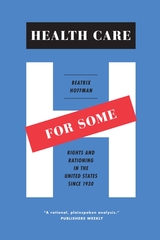3 books about Hoffman, Beatrix

Health Care for Some
Rights and Rationing in the United States since 1930
Beatrix Hoffman
University of Chicago Press, 2012
In Health Care for Some, Beatrix Hoffman offers an engaging and in-depth look at America’s long tradition of unequal access to health care. She argues that two main features have characterized the US health system: a refusal to adopt a right to care and a particularly American approach to the rationing of care. Health Care for Some shows that the haphazard way the US system allocates medical services—using income, race, region, insurance coverage, and many other factors—is a disorganized, illogical, and powerful form of rationing. And unlike rationing in most countries, which is intended to keep costs down, rationing in the United States has actually led to increased costs, resulting in the most expensive health care system in the world.
While most histories of US health care emphasize failed policy reforms, Health Care for Some looks at the system from the ground up in order to examine how rationing is experienced by ordinary Americans and how experiences of rationing have led to claims for a right to health care. By taking this approach, Hoffman puts a much-needed human face on a topic that is too often dominated by talking heads.
[more]

History and Health Policy in the United States
Putting the Past Back In
Stevens, Rosemary A
Rutgers University Press, 2006
In our rapidly advancing scientific and technological world, many take great pride and comfort in believing that we are on the threshold of new ways of thinking, living, and understanding ourselves. But despite dramatic discoveries that appear in every way to herald the future, legacies still carry great weight. Even in swiftly developing fields such as health and medicine, most systems and policies embody a sequence of earlier ideas and preexisting patterns.
In History and Health Policy in the United States, seventeen leading scholars of history, the history of medicine, bioethics, law, health policy, sociology, and organizational theory make the case for the usefulness of history in evaluating and formulating health policy today. In looking at issues as varied as the consumer economy, risk, and the plight of the uninsured, the contributors uncover the often unstated assumptions that shape the way we think about technology, the role of government, and contemporary medicine. They show how historical perspectives can help policymakers avoid the pitfalls of partisan, outdated, or merely fashionable approaches, as well as how knowledge of previous systems can offer alternatives when policy directions seem unclear.
Together, the essays argue that it is only by knowing where we have been that we can begin to understand health services today or speculate on policies for tomorrow.
In History and Health Policy in the United States, seventeen leading scholars of history, the history of medicine, bioethics, law, health policy, sociology, and organizational theory make the case for the usefulness of history in evaluating and formulating health policy today. In looking at issues as varied as the consumer economy, risk, and the plight of the uninsured, the contributors uncover the often unstated assumptions that shape the way we think about technology, the role of government, and contemporary medicine. They show how historical perspectives can help policymakers avoid the pitfalls of partisan, outdated, or merely fashionable approaches, as well as how knowledge of previous systems can offer alternatives when policy directions seem unclear.
Together, the essays argue that it is only by knowing where we have been that we can begin to understand health services today or speculate on policies for tomorrow.
[more]

Patients as Policy Actors
Hoffman, Beatrix
Rutgers University Press, 2011
Patients as Policy Actors offers groundbreaking accounts of one of the health field's most important developments of the last fifty years--the rise of more consciously patient-centered care and policymaking. The authors in this volume illustrate, from multiple disciplinary perspectives, the unexpected ways that patients can matter as both agents and objects of health care policy yet nonetheless too often remain silent, silenced, misrepresented, or ignored. The volume concludes with a unique epilogue outlining principles for more effectively integrating patient perspectives into a pluralistic conception of policy-making. With the recent enactment of the Patient Protection and Affordable Care Act, patients' and consumers' roles in American health care require more than ever the careful analysis and attention exemplified by this innovative volume.
[more]
READERS
Browse our collection.
PUBLISHERS
See BiblioVault's publisher services.
STUDENT SERVICES
Files for college accessibility offices.
UChicago Accessibility Resources
home | accessibility | search | about | contact us
BiblioVault ® 2001 - 2024
The University of Chicago Press









